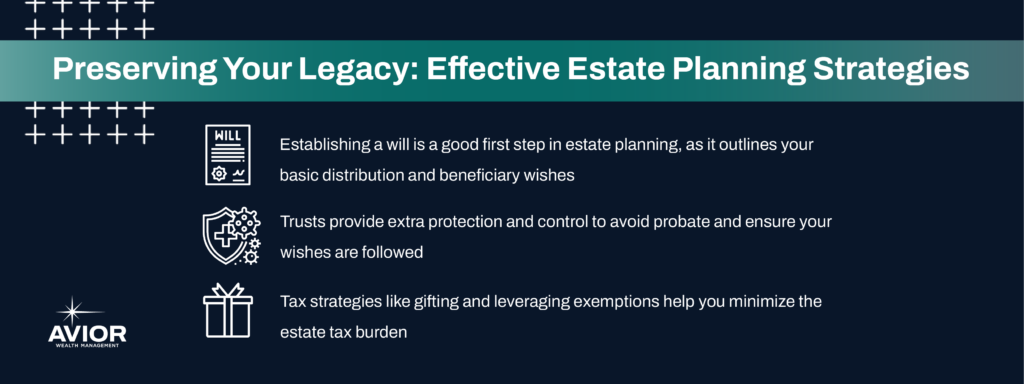Preserving Your Legacy: Effective Estate Planning Strategies
Estate planning helps you understand estate laws, manage tax implications, and ensure your wishes are effectively executed.

Estate planning is a critical component of shaping and preserving your legacy. But there are so many complexities and emotional challenges that families face when contemplating their estate’s future, which can get in the way of prioritizing it.
Taking action requires more than just distributing assets. It’s about ensuring that your wishes are honored, minimizing tax burdens, and providing a secure future for your loved ones.
This post simplifies complex estate planning strategies into understandable, actionable steps, providing guidance on legacy planning. With the right tools, you can be assured that your legacy will be protected.
The will as the foundation of estate planning
Drafting a will is one of the first steps to take in any comprehensive estate planning strategy. This document covers your wishes for the distribution of your assets once you’re gone. A will not only serves as a legal document but also as a crucial guide that ensures your intentions are honored and your legacy preserved.
The will outlines concerns like:
- Which beneficiaries will inherit specific assets and property
- Designation of guardianship for minor children
- How assets will be distributed
- Who will be responsible for executing these wishes as the estate’s executor
The will provides clarity in an already emotional time, alleviating potential conflicts among family members and minimizing the likelihood of disputes over the distribution of assets. It expedites the probate process, which is the legal validation of the will, ensuring a smoother transition of assets to beneficiaries.
Using trusts for more control and asset protection
Trusts are also powerful instruments in estate planning. They provide you with greater control over the distribution and protection of your assets.
With trusts, you place assets into a legal entity, separate from your personal estate. This separation can safeguard these assets from creditors, legal disputes, and other financial challenges. Different types of trusts cater to diverse needs, offering tailored solutions for individuals with specific goals in mind.
Irrevocable trusts, for example, create a legal boundary that shields assets from estate taxes and creditors, providing a secure haven for wealth preservation. Living trusts allow you to retain control over your assets during your lifetime while facilitating the transfer of these assets to beneficiaries upon your death, avoiding the probate process. This meets your wishes while minimizing the burden on your heirs.
Additionally, trusts can provide for loved ones with specific needs, such as minors or individuals with disabilities. Special needs trusts offer a structured way to manage and protect assets for those who may require ongoing care, ensuring that the funds are allocated appropriately and do not jeopardize eligibility for government assistance programs.
Tax strategies for estate planning
Taxes can have a big impact on the preservation and distribution of wealth. Estate taxes, often referred to as the death tax or inheritance taxes, can pose a substantial financial burden, potentially diminishing your intended legacy.
Strategies for minimizing estate and inheritance taxes are essential components of a well-rounded estate plan and include:
- Leveraging tax exemptions: Reduce the taxable value of your estate by utilizing lifetime estate tax exemption and the annual gift tax exclusion.
- Gifts: Gifting assets during one’s lifetime, either outright or through mechanisms like trusts, can be a powerful tool to diminish the overall tax liability of your estate.
- Trusts: Certain trusts, such as irrevocable life insurance trusts (ILITs) or qualified personal residence trusts (QPRTs), can be instrumental in minimizing tax burdens. ILITs, for instance, enable individuals to remove life insurance proceeds from their taxable estate, providing a tax-efficient method of passing on wealth. QPRTs allow for the transfer of a primary residence to an irrevocable trust, potentially reducing the taxable value of the estate.
Strategic wealth transfer techniques, like family limited partnerships or limited liability companies, can also play a role in minimizing estate taxes by facilitating the gradual transfer of assets to heirs while maintaining control during your lifetime.
Proactively addressing tax implications and employing effective strategies now means you can optimize the distribution of assets to your heirs, fostering financial continuity.
Designating powers of attorney and healthcare directives
Powers of attorney and healthcare directives empower you to appoint trusted representatives who can make financial and healthcare decisions on your behalf in the event you become incapacitated. A financial power of attorney grants someone the authority to manage financial matters, such as paying bills or making investment decisions, while a healthcare directive allows an individual to outline their preferences regarding medical treatment and end-of-life care.
These documents provide a clear framework for decision-making, ensuring that your wishes are honored. Selecting a reliable and responsible individual to serve as a power of attorney or healthcare agent requires careful consideration. Choose someone who understands and respects your values and preferences, particularly in matters of healthcare, where deeply personal choices may need to be made.
Charitable giving and philanthropic goals
Incorporating charitable giving into estate planning is a meaningful way to leave a lasting legacy and support the causes you care about most. Beyond the financial aspects of estate planning, integrating philanthropy allows you to make a positive impact on your community and the world. Charitable giving can take various forms and estate planning helps you structure these contributions strategically, ensuring they align with your values and philanthropic objectives.
One effective method of incorporating charitable giving into estate planning is through the use of charitable trusts. Charitable remainder trusts (CRTs) and charitable lead trusts (CLTs) are two common types that offer distinct approaches to achieving philanthropic goals. A CRT allows you to contribute assets to a trust, receive income from the trust during your lifetime, and then direct the remaining assets to a charitable organization upon your passing.
A CLT generates income for a charitable cause for a specified period, after which the remaining assets are distributed to beneficiaries. These trusts not only provide financial benefits for you or your heirs but also contribute to the betterment of society.
Direct donations are another straightforward way to integrate charitable giving into estate planning. You can designate specific amounts or a percentage of your estate to go directly to charitable organizations of your choice. This can be accomplished through bequests in a will or by naming charitable beneficiaries on retirement accounts or life insurance policies.
Secure your legacy with estate planning
Taking proactive steps now can secure your legacy and provide peace of mind. These strategies help you ensure you’re considering what will happen to your wealth and estate in the future when you won’t be around to see it through.
Get started with legacy planning and wealth management today. Contact the Avior team to work with an experienced advisor who can help you reach your goals.
Disclaimer: Nothing contained herein should be construed as legal or tax advice. Avior and our Advisors will work with your attorney and/or tax professional to assist with your legal and tax strategies. Please consult your attorney or tax professional with specific legal and/or tax questions.
No Comments
Sorry, the comment form is closed at this time.




